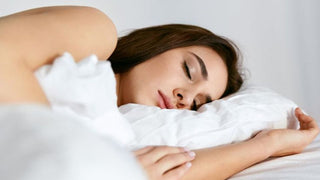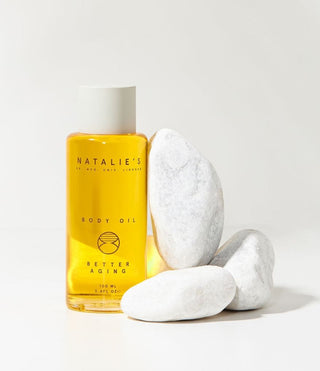Getting a good night's sleep is an extremely important part of the beauty routine and gives new color to sallow skin. It's not without reason that people talk about beauty sleep. But how does the way we sleep affect our skin? And how does lack of sleep affect the skin? Keep reading to gain valuable insights about the sleep-skin-connection.
Table of Contents
1. How does the skin behave during sleep?
Scientists have found that during sleep there is a kind of detoxification process of the brain. Thus, the brain breaks down 60 percent more toxins when it "sleeps" properly, which contributes to a feeling of freshness and relaxation and gives the skin a natural glow.
During the night's rest, our skin loses more moisture and the body temperature drops slightly. As a result, heat is dissipated through the skin, which in turn leads to an increase in skin temperature. But not only that - numerous molecular, cellular and physiological processes in our body follow an internal clock and are set in motion again during sleep. As a result, the skin is better supplied with blood and oxygen.
The release of growth hormones stimulates collagen formation, which increases the elasticity of the skin. The sleep hormone melatonin also plays an important role for our skin. Released in the dark, it has an antioxidant effect and protects the skin from the influence of free radicals. In this way, it prevents premature aging of the skin.
On a cellular level, it has been proven that at night the division rate and thus the number of epidermal stem cells increases, which promotes the renewal and regeneration of the skin. Since not only our outer skin but also our internal organs are covered by mucous membranes, an intact skin metabolism is of crucial importance.
2. How does lack of sleep affect the skin?
A healthy sleep is essential for our body to rest and recover from daily efforts. Lack of sleep can cause a number of problems when it comes to our health - it does not only affect our mood, but can also weaken the immune system and affect the condition of the skin. First and foremost, elevated cortisol levels increase the appearance of pimples, which is not only due to the creation of pro-inflammatory substances in our body, but also due to increased sebum production. In addition, cortisol impairs the production of hyaluronic acid, which is necessary for moisturizing the skin. This leads to an even greater dehydration of the skin, as cortisol attacks the skin's barrier function. Especially over a longer period of time, the lack of sleep shows on the skin. Typical symptoms of the skin are:
- Dark circles under the eyes
- Puffiness
- Reddened eyelids
- Dry skin
- Pale complexion
- Wrinkles
3. The right sleeping position
A good night's sleep has a significant impact on the appearance of our skin. Just as sufficient good sleep has a positive effect on skin tone, texture and appearance, certain sleeping positions can have negative effects on the aging process of the skin.
The best sleeping position is considered to be the supine position - also called the "royal supine position." In this sleeping position, unlike in the side position, the spine retains its natural S-shape and the neck and back are relieved. In addition, the body weight is evenly distributed in this way. Although very few people sleep on their backs, this sleeping position is ideal for a much-needed night's rest. Sleeping on the back smooths wrinkles on the neck and décolleté and the skin can relax wonderfully.
The prone position, on the other hand, is considered one of the most unfavorable sleeping positions. The reason: it can lead to premature aging of the skin and causes fluid accumulation under the eyes.
Sleeping on your side can also have negative consequences for your face, especially if you prefer one side and rely on it most of the time while sleeping. Lying on the side reduces the elasticity of the skin and has a negative effect on our facial muscles. Moreover, long-term side position promotes wrinkles and inevitably leads to premature aging of the skin.
4. What promotes skin regeneration?
- Choose the right sleeping position: Take alternating sleeping positions and try to sleep in the supine position as much as possible to keep your skin young.
- Change your pillowcases regularly: Change your bedding regularly to avoid the accumulation of bacteria, fungi and mites and maintain the comfort factor. Pillows with silk covers can reduce friction on the skin, contributing to a healthy skin barrier.
- Use a humidifier: according to experts, the room temperature in the bedroom should be between 16 and 18 degrees at best, as heat can cause itching, sweating and oily skin. As a base, a humidifier is suitable to create a good environment for the regeneration of dry skin.
- Thorough cleansing: Before going to bed, you should always remove your makeup and rid your skin of dirt particles. This supports the natural regeneration of the skin and helps to counteract signs of aging and fatigue.
- Use the right skin care: Daily application of a sunscreen with a sun protection factor (SPF) of at least 30 also plays an important role. For added moisture, it's a good idea to include a retinol-based serum in your evening skincare routine three to four times a week. Natalie's Cosmetics products contain, among other things, a high concentration of vitamins C and E, which have an antioxidant effect on the skin. They nourish and intensively moisturize the skin for a noticeably refreshed and radiant complexion. At the same time, they provide exceptional results for wrinkles, thin lines, aging skin as well as stretch marks. To learn more about the benefits of vitamin C in skin care read our blog article.
5. Which skin care products are suitable for the night?
For the best support of the skin's nighttime regeneration processes, we recommend our following products:
- Hydration Body Gel: Natalie's Hydration Body Gel contains a valuable blend of innovative ingredients that actively hydrate and soothe your skin after a shower or a day in the sun to support a refreshed and radiant complexion.
- Better Aging Lotion: The lotion contains Bakuchiol, a relatively new trendy natural ingredient with retinol-like properties. Hyaluronic acid, squalane and organic shea butter nourish the skin and provide it with intensive moisture.
- Better Aging Body Oil: Natalie's Better Aging Body Oil is enriched with a potent blend of organic, non-comedogenic oils and herbal extracts that reduce signs of aging and give your skin a visibly firmer appearance. Enriched with guggul and backuchiol, a natural form of retinol, Natalie's Better Aging Body Oil stimulates collagen production, reduces wrinkle depth and strengthens cell capacity.


